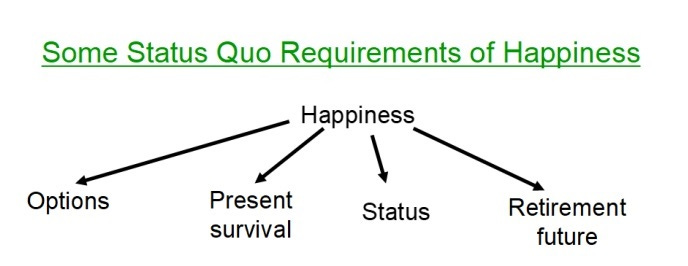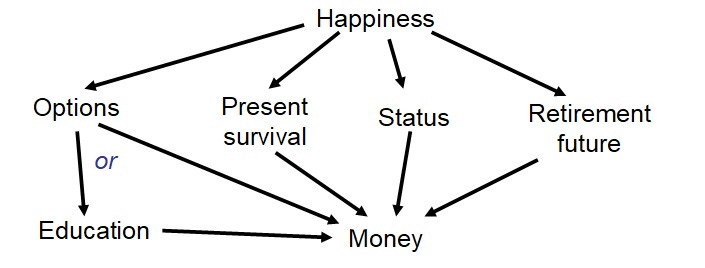How it All Ends
Being an advancing crisis, the Value Crisis will indeed come to an end. Here's two categories of endings. AND Part 1 of a possible solution!
[This article is part 1 of a 4-part series. Minimal prerequisite reading might be this.]
I claim to have a practical, realistic, and already-understood action that might very well facilitate the paradigm shift needed to start resolving the value crisis.
How will the value crisis end?
The first category of endings all involve civilizational collapse. There are plenty of fine works out there that offer very compelling evidence why this is going to happen to society, as we know it, sooner or later—and getting sooner all the time. Most point out that every civilization we have ever known of (at least in their empire form) eventually collapsed. How this will actually play out, and what the end result might be, I leave to those apocalyptic historians and theorists who have a much better handle on that subject than I.
The second category—evolution—is not going to be much nicer. I do believe that some serious systemic failures are probably a prerequisite for change. The reason for this is something I call the Value Change Conundrum. That doesn’t mean that we can’t make huge strides, both individually and collectively, before those things happen.
The most serious threat to humanity right now is not our collective behaviours. Rather, it is the fact that, when number-based values trump all others, there are an increasingly small number of ‘winners’, and everyone else (including other lifeforms on this planet) will be the losers. This is not attributable to any innate selfishness or greed—it is simply a mathematical certainty, based on the rules of the game that are inherent in number-based value systems. (The proof is not difficult, and I’ll spare you the math for now, but some hints might be found here.)
Accepting the Polarity
Since my claim is that the societal polarity of number-based values and qualitative values is not being managed properly, an essential part of resolving the value crisis is to give qualitative values the precedence that we need them to have for our survival as a species. In my second book, I explore many different ways to champion qualitative values while still operating in our number-based economy and More-Is-Always-Better world. Often, it’s as simple(!) as executing a perception flip.
For example, low-income earners usually have no choice but to let their income determine their standard of living. However, once a comfortable standard has been reached, why not flip that and let your chosen standard of living determine your income? If you are earning enough to maintain a consciously selected standard of living, then you can make a deliberate decision that more is not better. Simply introducing the concept of sufficiency is enough to transition away from the number-based value to the qualitative objective of whatever well-being you’ve decided is enough for you. It is not about giving things up; it is about shifting your focus—deriving equivalent (or more) joy from different things.
I remember from my corporate facilitation days that psychologists used to teach a variation of this, called the But-Flip. Take a statement like: “I’d love to spend more time with friends, but my boss is asking me to work more hours.” Effecting a changed perspective is sometimes as simple as flipping the statement around the “but”, producing: “My boss is asking me to work more hours, but I’d love to spend more time with friends.” Do you see the change in value focus?
PRO TIP: The But-Flip is a powerful way to respond to an “A, but B” statement when you are trying to persuade, or resolve a disagreement. Echo back: “Okay, so let me see if I understand you correctly. You believe B, but A, right?”
Survival & Happiness
Of course, there are some changes that are much more difficult to make as an individual… “That’s all very lovely, Andrew. The reality is I have to pay my rent and buy groceries! I need to earn the money. As for your concept of sufficiency, that’s a nice dream, but there never seems to be enough to be sufficient. I also have to try and sock some funds away for difficult times to come.”
I hear you.
So, in one post, I said it’s not just about the money. However, money is without a doubt the most significant numbers-based value to address. That’s because so much of our happiness and our very survival is now entirely based on money. So let’s look at that in a little more detail.
What are some major components of happiness? Here are four:
Present survival. This hearkens back to good old Maslow’s Hierarchy of Needs. We cannot even begin to be happy unless our basic physiological needs are met.
Options. Happiness is not possible unless our life has options. This might also be referred to as having freedom or choices—some control over our life. (One common path to Options is Education.)
Status. By this, I’m not referring to social status so much as having dignity and respect. I believe this somewhat fuzzy concept is worth including as a prerequisite to happiness.
Retirement Future. As humans, we don’t just think about our current circumstances; we also think about our future—especially when we are no longer able to work for a living. Will we retain all of the above three components in our sunset years?
There are two very important things to notice about these four components of happiness: (A) They are all qualitative values—we don’t measure them by a number, although numbers might be involved in the tools and strategies to acquire them. (B) Within our current status quo economies, all four components seem to require money.
From this, it might be easily concluded that money does indeed determine happiness—even for the qualitative values. Exercise caution with such conclusions. There is a world of difference between money as a tool and money maximization as an objective. All four components also have a built-in concept of sufficiency. THAT is the shift we need.
I recognize the importance of money within our neoclassical economic paradigm. It is the paradigm that I’m questioning, not people’s strategy for coping with it.
I claim to have a practical, realistic, and already-understood action that might very well facilitate the paradigm shift needed to start resolving the value crisis. Forgive me if I don’t go straight there. I believe some groundwork has to be laid first. After all, if it was an obvious solution, better people than I would have been shouting it from the rooftops long before now. (In fact, my proposal has been shouted from the rooftops before now, but mostly with a different objective.)
Most of my previous articles in this Substack series have been supplying the framework for the way I view our greatest challenge—creating awareness of precisely the dilemma which I believe has to be solved. That’s Step 0, if you will.
This essay would be Step 1, where I attempt to describe what any solution actions will be aimed at doing. In a nutshell:
We are trying to correct a severe imbalance in the precedence we assign to two different kinds of values. To do that, we have to begin to change how we define successfulness, both as individuals and as a society—without entirely ignoring our current reality. Our relationship with money is going to have to be our first target.
Who’s with me so far?
Ready to move on to Step 2?







It's not so much our relationship to money but (that word again) our relationship to debt. Debt once created is permanent until repaid or defaulted upon. Most "investments" are not actual assets such as property assets, they are debt "assets," an expanded form of money abstracted from money as means of payment settlement. The assumed ability to create debt, both financial and extracted from Nature, fuels the ability to over-consume. So we have both a debt bubble, natural and financial and an excitement bubble which fuels our extravagant demand for fascinating distractions from our basic human boredom. Finding a pathway to living in harmony with this planet requires abandoning the need for excitement and learning to cope with boredom.
To play on one of your headings, I think it will bring people great happiness to be surviving during the Ecological Overshoot Unraveling.